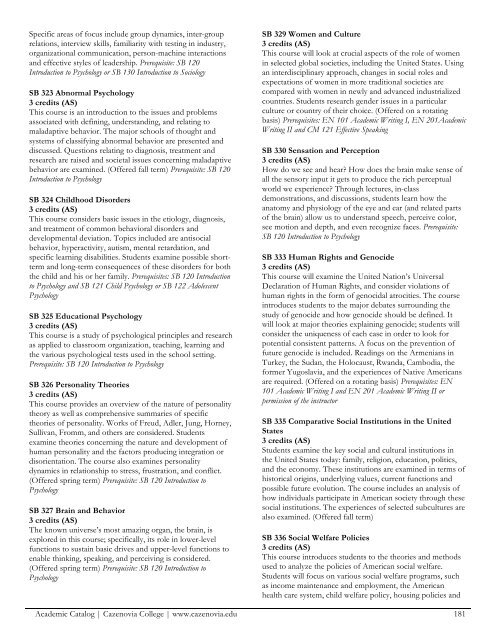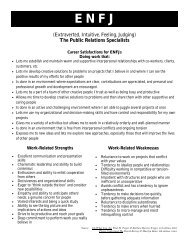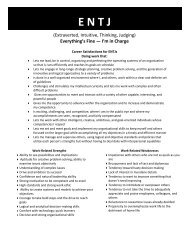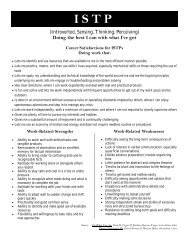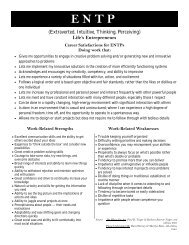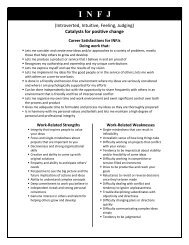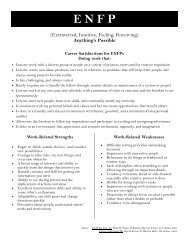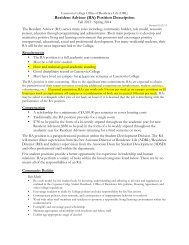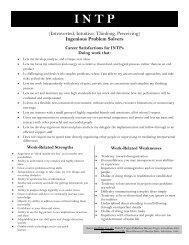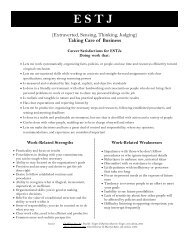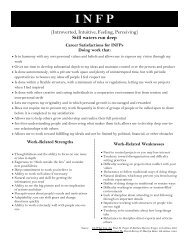of
2013-14 Academic Catalog - Cazenovia College
2013-14 Academic Catalog - Cazenovia College
- No tags were found...
Create successful ePaper yourself
Turn your PDF publications into a flip-book with our unique Google optimized e-Paper software.
Specific areas <strong>of</strong> focus include group dynamics, inter-group<br />
relations, interview skills, familiarity with testing in industry,<br />
organizational communication, person-machine interactions<br />
and effective styles <strong>of</strong> leadership. Prerequisite: SB 120<br />
Introduction to Psychology or SB 130 Introduction to Sociology<br />
SB 323 Abnormal Psychology<br />
3 credits (AS)<br />
This course is an introduction to the issues and problems<br />
associated with defining, understanding, and relating to<br />
maladaptive behavior. The major schools <strong>of</strong> thought and<br />
systems <strong>of</strong> classifying abnormal behavior are presented and<br />
discussed. Questions relating to diagnosis, treatment and<br />
research are raised and societal issues concerning maladaptive<br />
behavior are examined. (Offered fall term) Prerequisite: SB 120<br />
Introduction to Psychology<br />
SB 324 Childhood Disorders<br />
3 credits (AS)<br />
This course considers basic issues in the etiology, diagnosis,<br />
and treatment <strong>of</strong> common behavioral disorders and<br />
developmental deviation. Topics included are antisocial<br />
behavior, hyperactivity, autism, mental retardation, and<br />
specific learning disabilities. Students examine possible shortterm<br />
and long-term consequences <strong>of</strong> these disorders for both<br />
the child and his or her family. Prerequisites: SB 120 Introduction<br />
to Psychology and SB 121 Child Psychology or SB 122 Adolescent<br />
Psychology<br />
SB 325 Educational Psychology<br />
3 credits (AS)<br />
This course is a study <strong>of</strong> psychological principles and research<br />
as applied to classroom organization, teaching, learning and<br />
the various psychological tests used in the school setting.<br />
Prerequisite: SB 120 Introduction to Psychology<br />
SB 326 Personality Theories<br />
3 credits (AS)<br />
This course provides an overview <strong>of</strong> the nature <strong>of</strong> personality<br />
theory as well as comprehensive summaries <strong>of</strong> specific<br />
theories <strong>of</strong> personality. Works <strong>of</strong> Freud, Adler, Jung, Horney,<br />
Sullivan, Fromm, and others are considered. Students<br />
examine theories concerning the nature and development <strong>of</strong><br />
human personality and the factors producing integration or<br />
disorientation. The course also examines personality<br />
dynamics in relationship to stress, frustration, and conflict.<br />
(Offered spring term) Prerequisite: SB 120 Introduction to<br />
Psychology<br />
SB 327 Brain and Behavior<br />
3 credits (AS)<br />
The known universe’s most amazing organ, the brain, is<br />
explored in this course; specifically, its role in lower-level<br />
functions to sustain basic drives and upper-level functions to<br />
enable thinking, speaking, and perceiving is considered.<br />
(Offered spring term) Prerequisite: SB 120 Introduction to<br />
Psychology<br />
SB 329 Women and Culture<br />
3 credits (AS)<br />
This course will look at crucial aspects <strong>of</strong> the role <strong>of</strong> women<br />
in selected global societies, including the United States. Using<br />
an interdisciplinary approach, changes in social roles and<br />
expectations <strong>of</strong> women in more traditional societies are<br />
compared with women in newly and advanced industrialized<br />
countries. Students research gender issues in a particular<br />
culture or country <strong>of</strong> their choice. (Offered on a rotating<br />
basis) Prerequisites: EN 101 Academic Writing I, EN 201Academic<br />
Writing II and CM 121 Effective Speaking<br />
SB 330 Sensation and Perception<br />
3 credits (AS)<br />
How do we see and hear? How does the brain make sense <strong>of</strong><br />
all the sensory input it gets to produce the rich perceptual<br />
world we experience? Through lectures, in-class<br />
demonstrations, and discussions, students learn how the<br />
anatomy and physiology <strong>of</strong> the eye and ear (and related parts<br />
<strong>of</strong> the brain) allow us to understand speech, perceive color,<br />
see motion and depth, and even recognize faces. Prerequisite:<br />
SB 120 Introduction to Psychology<br />
SB 333 Human Rights and Genocide<br />
3 credits (AS)<br />
This course will examine the United Nation’s Universal<br />
Declaration <strong>of</strong> Human Rights, and consider violations <strong>of</strong><br />
human rights in the form <strong>of</strong> genocidal atrocities. The course<br />
introduces students to the major debates surrounding the<br />
study <strong>of</strong> genocide and how genocide should be defined. It<br />
will look at major theories explaining genocide; students will<br />
consider the uniqueness <strong>of</strong> each case in order to look for<br />
potential consistent patterns. A focus on the prevention <strong>of</strong><br />
future genocide is included. Readings on the Armenians in<br />
Turkey, the Sudan, the Holocaust, Rwanda, Cambodia, the<br />
former Yugoslavia, and the experiences <strong>of</strong> Native Americans<br />
are required. (Offered on a rotating basis) Prerequisites: EN<br />
101 Academic Writing I and EN 201 Academic Writing II or<br />
permission <strong>of</strong> the instructor<br />
SB 335 Comparative Social Institutions in the United<br />
States<br />
3 credits (AS)<br />
Students examine the key social and cultural institutions in<br />
the United States today: family, religion, education, politics,<br />
and the economy. These institutions are examined in terms <strong>of</strong><br />
historical origins, underlying values, current functions and<br />
possible future evolution. The course includes an analysis <strong>of</strong><br />
how individuals participate in American society through these<br />
social institutions. The experiences <strong>of</strong> selected subcultures are<br />
also examined. (Offered fall term)<br />
SB 336 Social Welfare Policies<br />
3 credits (AS)<br />
This course introduces students to the theories and methods<br />
used to analyze the policies <strong>of</strong> American social welfare.<br />
Students will focus on various social welfare programs, such<br />
as income maintenance and employment, the American<br />
health care system, child welfare policy, housing policies and<br />
Academic Catalog | Cazenovia College | www.cazenovia.edu 181


